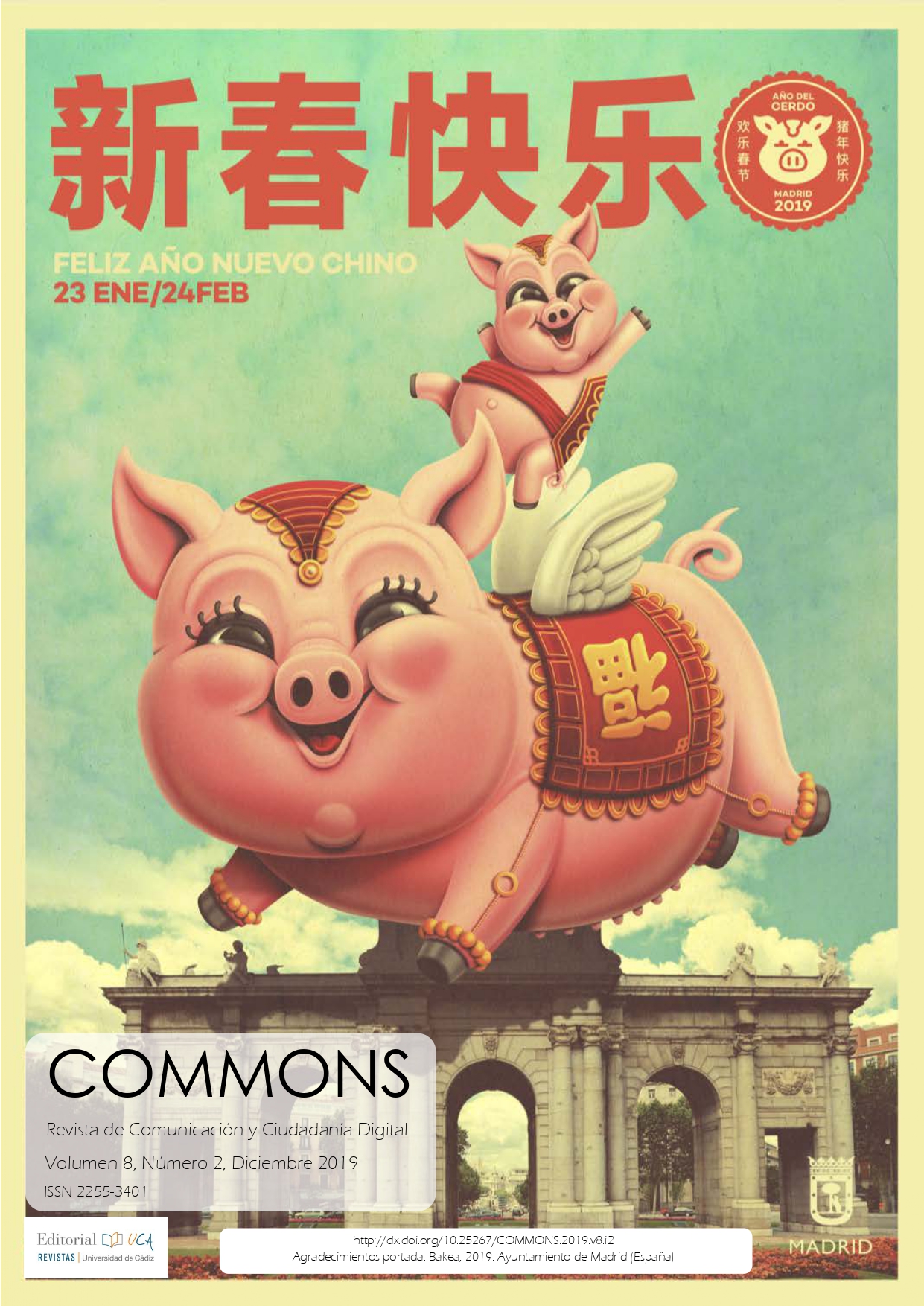El debate público online en Cuba: sujetos interlocutores y politización de conversaciones sobre migración en el sitio Cubadebate / The Online Public Debate in Cuba: Interlocutors and Politization of Conversations on Migration in the Site Cubadebate
Abstract
The article proposes an integrative approach to online conversational spaces and their political dimension, based on the articulation of various institutional and media actors involved in the development of public debate in Cuba. Therefore, the concept of politicization of online conversations is discussed, in order to highlight the interrelation between dimensions of context and discourse in those interactions. Thus, we analyze conversations on migration issues in Cubadebate between 2013 and 2017; complementing the analysis with interviews made to directors and journalists of the site. In this way, we show how this communicative space functions simultaneously as a discussion forum, a channel of communication with the government and a vehicle for discussing the news agenda of the media. Finally, we observe that the online conversation can also be politicized from its intertwining with offline experiences and from the discursive reconfiguration of subjects existence.
Keywords
Downloads
How to Cite
License
Authors who have published with this journal accept the following terms:
- Authors shall retain their copyright and guarantee the journal the right of first publication of their work, which shall simultaneously be subject to the Creative Commons 3.0 Recognition License, which allows third parties to share the work as long as its author and first publication are indicated in this journal.
- Authors may adopt other non-exclusive licensing agreements for the distribution of the published version of the work (e.g., depositing it in an institutional telematic archive or publishing it in a monographic volume) provided that the initial publication in this journal is indicated.
- Authors are permitted and encouraged to disseminate their work via the Internet (e.g., in institutional telematic archives or on their website) before and during the submission process, which may lead to interesting exchanges and increased citations of the published work. (See The Effect of Open Access).
References
ALONSO, R. (2013). Cubadebate: la interacción con sus audiências. Recuperado de: http://goo.gl/UuvZKG.
ARBOLEYA, J. (2015). Cuba y los cubanoamericanos, el fenómeno migratório cubano. La Habana: Editorial Casa de las Américas.
BUENO, T. (2015). Para que servem os comentários de leitores na internet? Tesis de Doctorado. Pontifícia Universidade Católica do Rio Grande do Sul, Brasil.
COE, K.; KENSKI, K. & RAINS, S. A. (2014). Online and Uncivil? Patterns and Determinants of Incivility in Newspaper Website Comments. Journal of Communication, 64, 658-679.
CONOVER, P., SEARING, D. & CREWE, I. (2002). The Deliberative Potential of Political Discussion. British Journal of Political Science, 32, 21-62.
DATOSMACRO.COM. (2015) Cuba: emigrantes totales. Expansión (online). Recuperado de: https://goo.gl/VRc8ef .
DEWEY, J. S. (1927). The Public and its Problems. Ohio.
DUANY, J. (2005). La migración cubana. Encuentro de la Cultura Cubana, 36,164- 181. • GRAHAM, T. & WRIGHT, S. (2015). A tale of two stories from “Below the Line” comment fields at the Guardian. The International Journal of Press/Politics, 20(3), 317-338.
GUTMANN, A. & THOMPSON, D. (1999). Democratic Disagreement. In S. MACEDO (Ed.). Deliberative Politics: essays on democracy and disagreement. Oxford: Oxford University Press, 243-279.
HAY, C. (2007). Why We Hate Politics. Cambridge: Polity Press.
HE, B. G. & WARREN, M. E. (2011). Authoritarian deliberation: The deliberative turn in Chinese political development. Perspectives on politics, 9(2), 269-289.
HERRERA, A. P. (2016). A mídia religiosa na esfera pública em Cuba: o papel desempenhado pela revista Espacio Laical. Tesis de Maestría. Universidade Federal de Minas Gerais.
MANSBRIDGE, J. (1999). Everyday Talk in Deliberative System. In S. MACEDO (Ed.). Deliberative Politics: essays on democracy and disagreement. Oxford: Oxford University Press, 211-239.
MARQUES, Â. C. S. (2007). O processo deliberativo a partir das margens: o programa Bolsa família na mídia e na fala das beneficiárias. Tesis de Doctorado. Faculdade de Filosofia e Ciências Humanas, Universidade Federal de Minas Gerais.
MARQUES, Â. C. S. & MAIA, R. C. M. A. (2008). A conversação sobre temas políticos em contextos comunicativos do cotidiano. Política & Sociedade, 7(12), 143-175.
MARQUES, Â. C. S. & MARTINO, L. M. S. (2017). A politização das conversas cotidianas e suas relações com processos deliberativos. Revista da Associação Nacional dos Programas de Pós-Graduação em Comunicação, 20(1).
PADILLA, A., RAMÍREZ, E. B. & CORCHO, D. (2017). Comunicación pública y democracia en Cuba: las controversias entre medios estatales y alternativos. In A. CABRAL et al. New Concepts and Territories in Latin America/Nuevos Conceptos y Territorios en América Latina. São José dos Pinhais, PR: Página 42, 494-519.
READER, B. (2012). Free Press vs. Free speech? The Rhetoric of ‘’civility’’ in regard to Anonymous Online Comments. Journalism & Mass Communication Quarterly, 89(3), 495- 513.
SAMPAIO, R. C. (2011). Quão deliberativas são discussões na rede? Um modelo de apreensão da deliberação online. In MAIA, R.; GOMES, W & MARQUES, F. P. Jami. (orgs.). Internet e participação política no Brasil. 1ª ed. Porto Alegre: Sulina.
SCHUDSON, M. (1997). Why conversation is not the soul of democracy. Critical Studies in Mass Communication, 14(4), 297–309.
VAN DIJCK, J. (2013). The culture of connectivity: A critical history of social media. Oxford University Press.
WOOD, M., FLINDERS, M. (2014). Rethinking depoliticisation: beyond the governmental. Policy & Politics, 42(2), 151-170.
WYATT, R. O., KATZ, E. & KIM, J. (2000). Bridging the spheres: Political and personal conversation in public and private spaces. Journal of communication, 50 (1), 71-92.
YOUNG, I. M. (2000). Inclusion and Democracy. Oxford: Oxford University Press.







